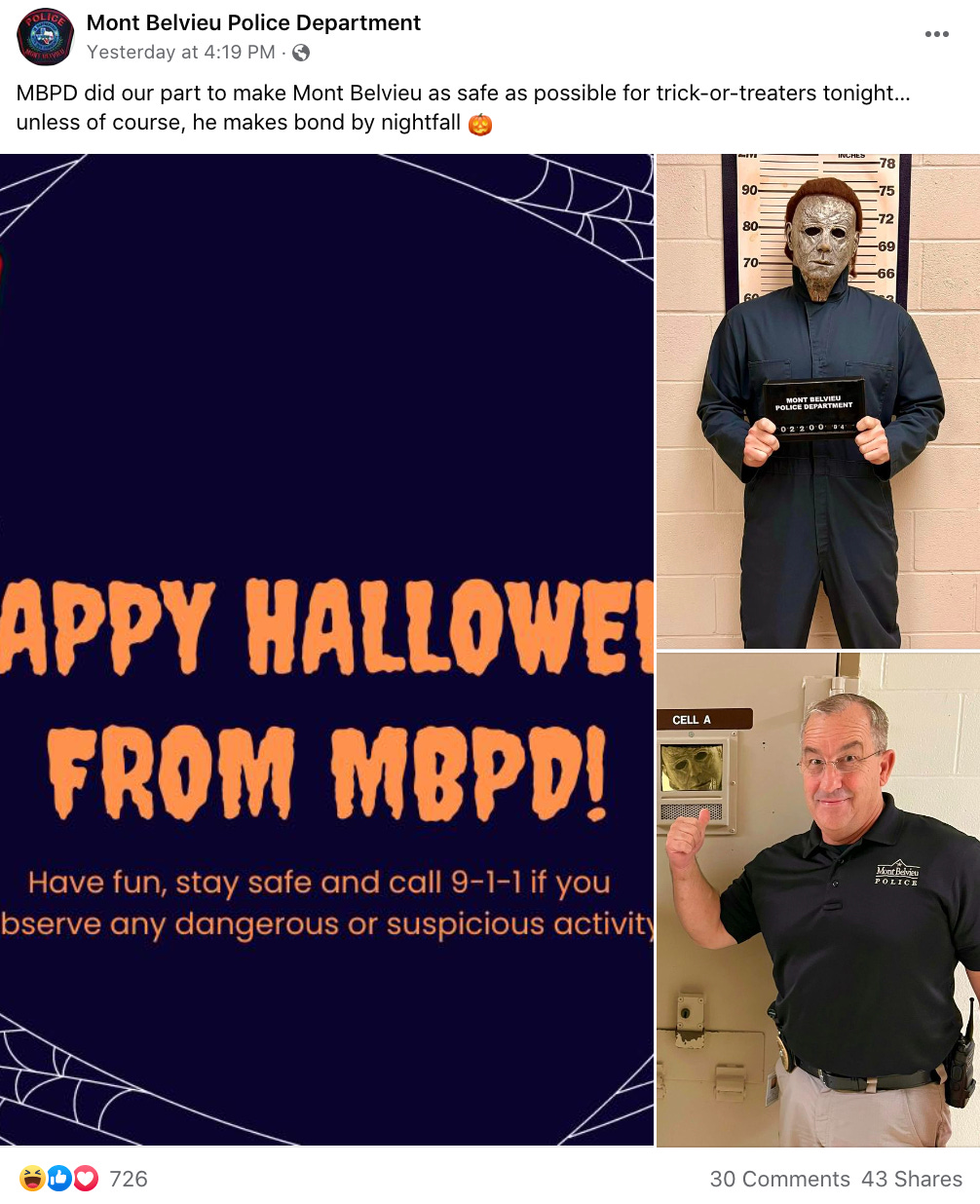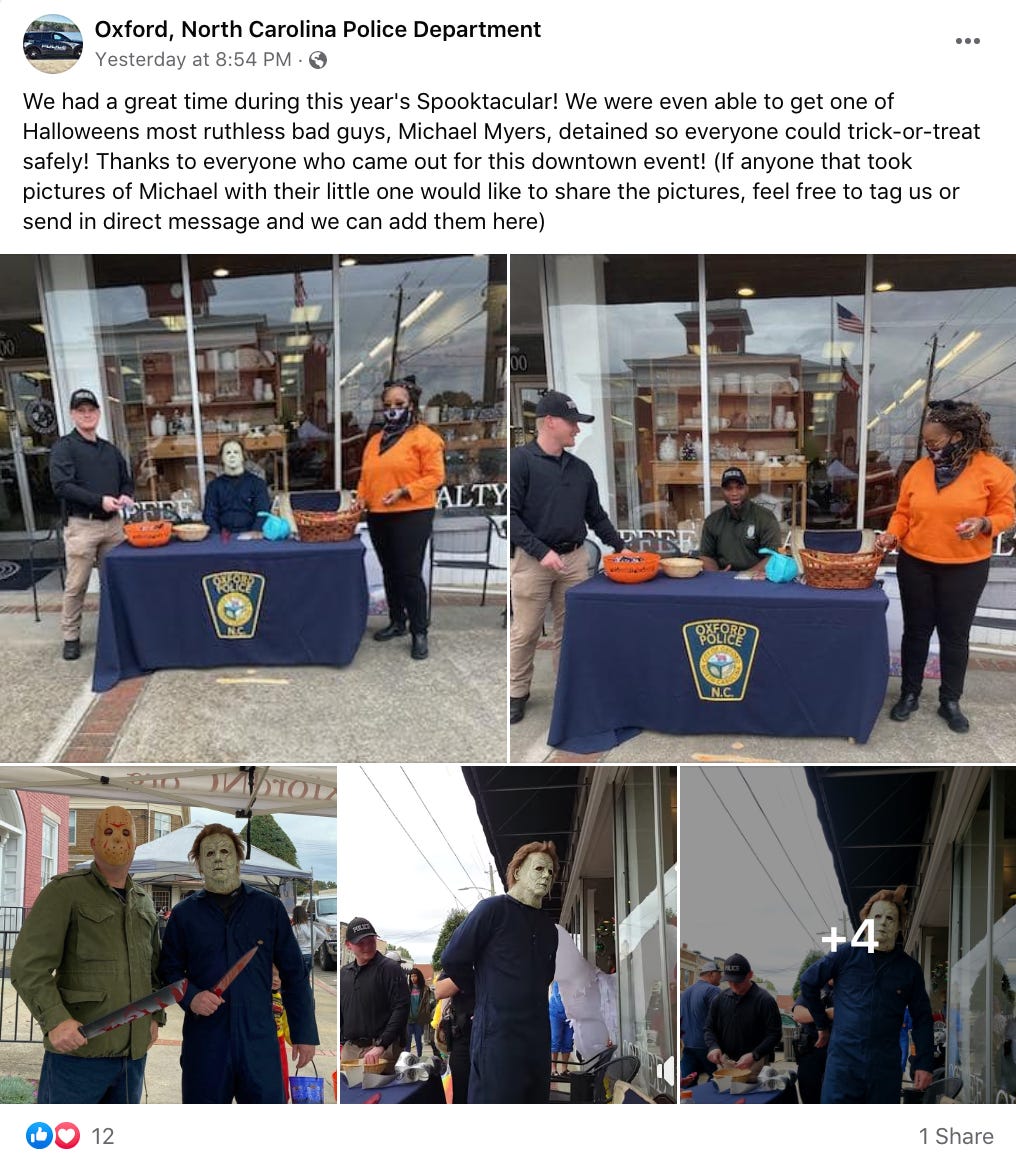Michael Myers backs the blue
A conversation with Travis Linnemann, author of "The Horror of Police"
Hi everyone! I’m back from my newsletter hiatus with my scAaaAAAaaAariest edition yet. Jump scares head!
If you think about it, the Halloween franchise is actually about the worst police department ever. Haddonfield’s finest are perpetually unable to protect the sleepy suburb’s citizens from one specific guy who:
Commits all his murders at the same time every year
Operates within a fixed geographic location
Always wears a a super distinctive outfit that he never changes
Kind of embarrassing, right?
And yet, this year, police departments across the country adopted Halloween’s supernatural psycho-killer Michael Myers as their unofficial mascot on Facebook.
A lot of these photoshoots are basically a rehash of the “arrest the Grinch” meme I wrote about at the end of last year—police departments, hungry for virality and community goodwill, go in with a play on the public shaming/“detective work” that cops do when they post mug shots or security camera footage on social media.
But some of these posts do something I find a lot weirder: They place Michael Myers into the shoes of a cop. It’s still obviously a joke, but there’s something uniquely unsettling about a police captain visiting a middle school in a Michael Myers costume while students swarm him.
There’s even a video skit that the police in Morganton, North Carolina posted in four parts on their Facebook page, in which Michael Myers trains to become a member of their police department.
Spoiler alert: The final gag is that Myers doesn’t get the gig. Instead, the academy instructors tap in a ski-masked Jason Voorhees as their next trainee. Ew?
And then, there’s whatever this unsettling shit is:
To help me unpack precisely why all of this is so creepy, I spoke to Travis Linnemann, an associate professor of sociology at Kansas State University and the author of The Horror of Police, which analyzes how cops operate in the real world and how they’re portrayed in popular fiction through the lens and language of the horror genre. We talked about why police departments love to do a little festive Facebook post, The Purge, and what might make a movie monster relatable to LEOs who are invested in a certain view of their job.
Can you tell me a little bit about your book, The Horror of Police? I haven't gotten the chance to read it yet, but the concept is fascinating.
The Horror of Police, on one level, is all the horrible things that we observe the police doing—the horrendous, murderous things. But on another level, I'm trying to make kind of a pessimistic, existentialist argument about the things we do as people to try to avoid what we can’t avoid: The world is a dangerous place, we're all gonna die, and we don't have answers for the questions that plague us the most. I'm trying to say, hey, we can understand the police that way.
We're always trying to find some avenue to security, and the police are the prime method of security in a lot of people's minds. We know they don't provide security, we know oftentimes they're dangerous themselves, but we won't let them go. I think that's kind of a profound insight into not only the reason why we have police, but some of the things that we're all afraid of. I use the horror genre as a metaphor—when the protagonist finally faces the monster and realizes the nature of the monster, when the mask comes off. I use all that stuff to try to talk about how policing operates in real life. It's a theory of films and TV shows, but also I try to ground it in real cases from real life.
I did get the chance to read the introduction to your book, and I love that you included the "Cannibal Cop"—I'm obsessed with that guy.
Whatever happened to that guy?
I don't know! I've seen the HBO documentary a couple times, but I haven't followed up since then. So, when did you start to get the idea to apply the horror reading to police media, and where did that come from?
In the work I do, I try to go back and forth between fantasy life and real life and play one off the other to find some insight. I was reading a guy named Mark Neocleous, who's been writing about police in a really impactful way for a couple decades. Some new work of his makes kind of the same argument I make—that we enlist the police as our "monster fighters." We create monsters, we unleash the police to fight our monsters for us, but his whole point is: Monsters fight monsters. We need to recognize the actual monstrosity of the police and police power.
So, I was reading this kind of legalistic, political theory work and I was watching the first season of True Detective and it was almost like Neocleous was in Nick Pizzolatto's ear. I was like, oh shit! They were hitting on the exact same thing. That's how I got the idea. I'm very influenced by other people's writing, but I think some of the stuff I was coming to logically as well. We're all picking up on some of the same things.
Totally—have you seen Johnny Damm's new project I'm A Cop, the horror comic where the text is all pulled from police union statements? What did you think about that?
Oh, Jesus, okay, I didn't do my homework. What did you think about it?
That's okay! Look at all this shit, you think I've read all this shit behind me? No, we've got a library. But I think [the comic] is really cool, it's brilliant. I found him on Twitter, he found me on Twitter—he was releasing those little draft cut-outs, and I was like hey, we're kinda talking about the exact same thing! It's really cool art; the comic book is cool itself, but he did a couple of quotes from my book for me, and he sent me the actual process—he makes a collage, so it's multi-layered. The depth and precision doesn't quite come out in the comic book.


What do you think police so directly employing this language of horror—monsters, being under siege, the dark night, blood in the streets—says about how they view themselves?
The whole "we are monster fighters" thing is one of their pat lines. It's fundamental to the idea of police: If not for the police, society would descend into anarchy and chaos. We need them. I think Johnny even found an excerpt from a cop referencing The Purge. Like, "It will turn into the Purge if we lose." You go back to the Fear City campaign in the 70s, when New York City was ready to be rendered bankrupt; A coalition of cops and firefighters—maybe even sanitation workers—all came together and put together a travelogue that was like, "Don't go outside, travel in pairs." Those sort of things to embolden fear—to get a better contract!
A few decades later, following the same sort of line. After the first Purge movie came out, the Miami Police Department was in a contract dispute with the mayor, and they photoshopped Miami-relevant images into the Purge stuff. They put the mayor in the Purge poster and shit. Same sort of logic! "You need us to fight your enemies, and if you don't have us, good luck. Get some popcorn and plenty of ammo." I had another one in the book from eastern Kentucky that's basically the same thing. This is like, their guiding reference.
Right, playing the hits. But then, I'm having a hard time parsing why they'd want to turn around and identify themselves with Michael Myers, a villain who literally kills cops?
I think the Michael Myers stuff is just outreach to show that they're relatable, they're cute. It’s the same as playing basketball with young Black kids in urban settings and other kids of forms of staged copaganda—giving a homeless dude shoes, stuff like that. So on that level, I think that's probably what they're trying to do.
I think you could write a whole bunch about these outreach efforts as counterinsurgency—winning hearts and minds of the public. There are people who will look at that uncritically and go, "Oh, give 'em a break, they're just trying to be nice guys." But that sort of thing bears some serious analysis and placement within this longer tradition of police trying to get people to think that they're just good guys. So, next time they do something horrendous, the idea is that we'll give them the benefit of the doubt.
But what they don't say is: Monsters fight monsters. That's another long-standing trope. So that Neocleous guy I was telling you about, he brought out, I don't know if you're familiar with the Rampart scandal in LA? It's a pretty interesting case. There was recently a pretty crappy movie with Johnny Depp and Forrest Whitaker, it was called "City of" something...
I don't think I am familiar.
It was these crooked LAPD detectives who were the model for Denzel Washington's character in Training Day. They were Bloods working for Suge Knight and they were legitimate suspects in the Biggie Smalls murder. These are bad people. But those guys, at the Rampart station, one of them said they should have put that quote by Nietzsche above the door to the station: "Whoever chases monsters should see to it that in the process he does not become a monster himself." Basically, it's the idea that a monster fighter can quickly become a monster, and they recognize that. The Mindhunter guy, Robert Ressler, his book is called He Who Fights Monsters. There's example after example of this.
Totally.
So, on the one hand, it's stupid outreach. But on the other hand, there is definitely a current of police culture that recognizes this kind of duality and prides itself on it. I know you know all about the sheepdog guy, the crazy-ass police trainer... Dave Grossman! His trope is, "the sheepdog and the sheep." The police are the sheepdogs and we are the sheep, and they protect us from the wolves. But there's a whole bunch of different examples where cops say, "No, I'm not a sheepdog, I'm actually a wolf as well." To me, the Michael Myers stuff makes sense—the base analysis of it is, they're just trying to be cute, but on the other hand, when we tells jokes, there's always a kernel of truth in every joke.
Questions, comments, corrections? (“You don’t know what it’s like to be a police officer” is not a correction.) Shoot me an email at k80way@protonmail.com, or DM me on Twitter.












Glad you're back!